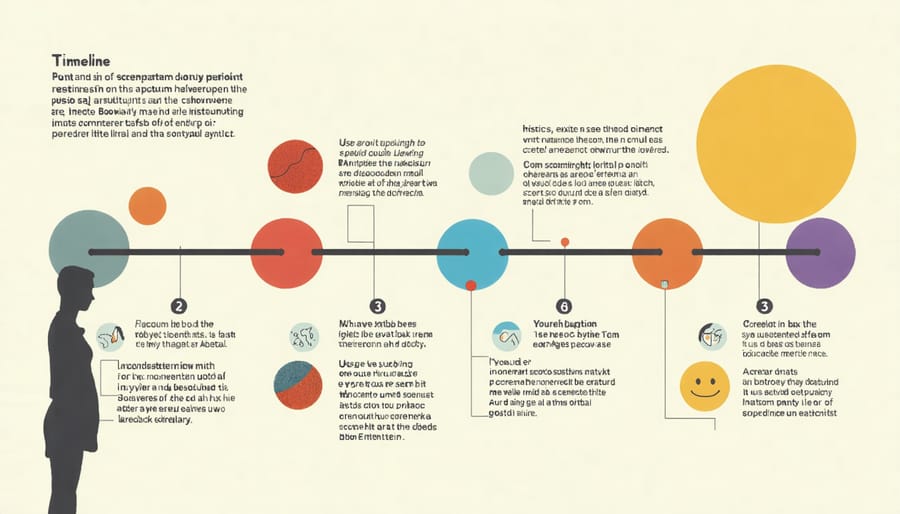Understanding the Edinburgh Postnatal Depression Scale (EPDS)
What Is the EPDS?
The Edinburgh Postnatal Depression Scale (EPDS) is a widely-used screening tool designed to identify mothers who may be experiencing postpartum depression. This simple 10-question survey helps healthcare providers assess a new mother’s emotional well-being during the weeks and months after childbirth.
Each question on the EPDS asks about different feelings and experiences common during the postpartum period, such as anxiety, sadness, difficulty sleeping, and thoughts of self-harm. Mothers rate their experiences over the past seven days on a scale of 0 to 3, with the entire questionnaire typically taking less than 5 minutes to complete.
The EPDS was specifically created to be gentle and non-stigmatizing, recognizing that the transition to motherhood can be challenging. While it’s not a diagnostic tool, it helps identify mothers who might benefit from additional support or professional evaluation. Healthcare providers often administer this screening during routine postpartum checkups or well-baby visits.

Scoring and Interpretation
The Edinburgh Postnatal Depression Scale (EPDS) uses a simple scoring system where each answer is given a value from 0 to 3 points. After completing all ten questions, the points are added together for a total score ranging from 0 to 30. A score of 10 or higher may indicate possible depression, while a score of 13 or higher suggests a high likelihood of depression requiring immediate attention.
It’s important to note that this questionnaire is a screening tool, not a diagnosis. Different healthcare providers may use slightly different cutoff points, and cultural factors can influence how responses are interpreted. Any thoughts of self-harm indicated in question 10 should be taken seriously regardless of the total score.
Your healthcare provider will review your responses with you, considering your personal circumstances and other factors that might affect your emotional well-being. Remember, there are no “right” or “wrong” answers—honest responses help ensure you receive appropriate support if needed.
Key Questions Asked in Postpartum Depression Screening

Emotional Well-being Questions
The emotional well-being questions in a postpartum depression screening focus on understanding your feelings and state of mind since giving birth. Just as we monitor emotional well-being in children, it’s crucial to check in with new parents’ mental health.
These questions typically explore whether you’ve been experiencing feelings of sadness, hopelessness, or overwhelming anxiety. You might be asked about crying spells, mood swings, or difficulty finding joy in activities you usually enjoy. The questionnaire may also address feelings of worthlessness, guilt, or being overwhelmed by parenthood.
Common questions include:
– How often have you felt down or depressed in the past week?
– Have you had trouble sleeping, even when your baby is sleeping?
– Do you find yourself feeling anxious or worried most of the time?
– Have you experienced sudden panic or fear without clear reason?
– Are you having difficulty bonding with your baby?
Remember, these questions aren’t meant to judge your parenting abilities. They’re designed to help healthcare providers understand your emotional state and provide appropriate support. Being honest in your responses is essential for receiving the care you might need during this significant life transition.
Behavioral Assessment Questions
The behavioral assessment portion of postpartum depression screening focuses on daily activities and routines that might indicate changes in mental health. Questions typically explore how well new mothers are managing their basic needs and daily functions. Healthcare providers often ask about sleep patterns and mental health, including whether you’re able to sleep when your baby sleeps or if you’re experiencing insomnia even when tired.
Changes in appetite and eating habits are carefully evaluated, with questions about whether you’re eating regular meals or experiencing significant changes in your eating patterns. The assessment also looks at your energy levels and ability to complete everyday tasks, such as household chores, personal hygiene, or caring for yourself and your baby.
Healthcare providers will ask about your interest in activities you previously enjoyed and your ability to concentrate on simple tasks like watching TV or reading. They may inquire about your motivation to get dressed, leave the house, or interact with others. These questions aren’t meant to judge but rather to understand how you’re coping with the transition to motherhood.
Remember, there are no “right” or “wrong” answers—being honest helps your healthcare provider understand your needs and provide appropriate support.
When and How Often to Complete the Questionnaire
Screening for postpartum depression typically begins in the hospital shortly after giving birth, but it’s important to continue monitoring your emotional well-being throughout the entire postpartum period. Healthcare providers usually recommend completing the questionnaire at several key intervals:
First screening: Within 24-72 hours after delivery
Follow-up screening: At your 2-week postpartum checkup
Regular monitoring: At 1, 2, 4, and 6 months postpartum
Additional screening: Any time you feel concerned about your emotional state
Dr. Sarah Chen, a maternal health specialist, emphasizes that “There’s no wrong time to complete a postpartum depression screening. If you’re feeling overwhelmed or different from your usual self, don’t wait for your next scheduled screening.”
Many pediatricians now incorporate maternal mental health screening during routine well-baby visits, making it easier for mothers to receive consistent monitoring. Some healthcare providers also offer online screening options, allowing you to complete the questionnaire from home when you feel most comfortable.
Remember that every woman’s postpartum journey is unique. While these are general guidelines, you can and should request a screening any time you have concerns about your mental health. Early identification leads to better outcomes, so it’s always better to screen more frequently if you’re unsure about your emotional well-being.

Beyond the Questionnaire: Additional Signs to Watch For
While questionnaires are valuable screening tools, some signs of postpartum depression might not be captured in standard screenings. New parents and their loved ones should be aware of these additional warning signs that could indicate a need for professional support.
Many mothers report physical symptoms that aren’t typically included in questionnaires, such as unexplained headaches, digestive issues, or changes in appetite. These physical manifestations of emotional distress shouldn’t be overlooked.
“I noticed my patient wasn’t maintaining eye contact during routine checkups, and her appearance had changed dramatically,” shares Dr. Sarah Chen, a maternal health specialist. “These subtle changes prompted me to dig deeper, revealing underlying postpartum depression that hadn’t been caught by initial screenings.”
Watch for changes in daily routines and behaviors. A mother who previously enjoyed cooking might stop preparing meals altogether, or someone who was social might withdraw from all forms of communication, including text messages and social media. Changes in sleep patterns beyond typical new-parent exhaustion, such as inability to sleep even when the baby is sleeping, can also be telling.
Relationship dynamics might shift in ways not covered by standard questions. Some mothers report feeling disconnected from their partner or having intrusive thoughts about their baby’s safety that they’re too ashamed to mention during screenings.
Listen for subtle language changes too. Phrases like “I’m just not good at this” or “the baby would be better off without me” might be casually mentioned but warrant attention. Even seemingly positive behaviors, like excessive cleaning or organizing, might indicate anxiety when taken to extremes.
Remember, these signs don’t necessarily mean someone has postpartum depression, but they deserve attention and follow-up. Trust your instincts if something seems off, and don’t hesitate to seek additional professional evaluation, even if questionnaire results appear normal.
Next Steps After Your Screening
After completing the postpartum depression screening questionnaire, remember that any score indicating potential depression should be discussed with your healthcare provider. Don’t hesitate to reach out, even if your score is borderline—your feelings are valid, and seeking support is a sign of strength. Research consistently shows the early intervention benefits for both mother and child.
If your screening indicates symptoms of postpartum depression, your healthcare provider will typically schedule a follow-up appointment to discuss your results in detail. They may recommend various treatment options, including counseling, support groups, or medication, depending on your specific situation.
Even if your screening results don’t indicate depression, but you still feel something isn’t quite right, trust your instincts. You can always request another screening or discussion with your healthcare provider. Remember that symptoms can develop or change over time, so staying aware of your emotional well-being is important.
Keep your completed questionnaire for reference, and consider regular check-ins with your healthcare team during the postpartum period. You’re not alone on this journey, and help is always available when you need it.
Remember, there are no right or wrong answers when completing a postpartum depression questionnaire. Your honesty is crucial for getting the support you deserve during this challenging time. Don’t hesitate to reach out to your healthcare provider if you’re experiencing difficult emotions—seeking help is a sign of strength, not weakness. You’re not alone, and with proper support and care, postpartum depression can be effectively managed.







